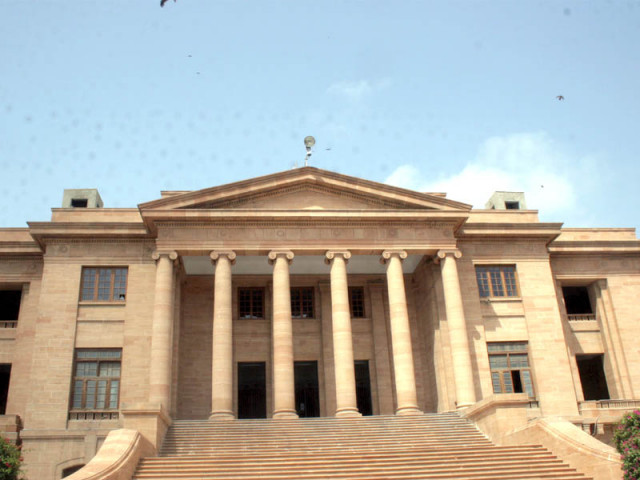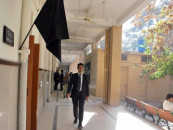A thorn in their side: Court allows NAB to proceed with pending inquiries
SHC hearing case challenging govt’s repeal of National Accountability Ordinance, 1999

Sindh High Court. PHOTO: EXPRESS
A two-judge bench, headed by SHC Chief Justice Ahmed Ali M Sheikh, further ordered that simultaneously the accountability courts in Sindh will also continue to proceed with corruption references fixed before them.
The bench passed these directives while hearing a petition jointly filed by the opposition parties - the Muttahida Qaumi Movement - Pakistan, Pakistan Muslim League – Functional, Pakistan Muslim League – Nawaz and Pakistan Tehreek-e-Insaf - challenging the recently enacted Sindh National Accountability Ordinance 1999 Repeal Bill, 2017. Last week, the court had issued notices on the petition to the federal and provincial law officers to file comments on behalf of the authorities concerned and NAB.
Opposition parties to challenge ordinance repeal in court
During Wednesday’s proceedings, the additional attorney-general, Salman Talibuddin, and NAB Prosecutor-General Waqas Qadeer Dar appeared. They requested time to file comments on behalf of the federal law ministry and NAB chairperson.
Allowing time, the judges directed the NAB prosecutor-general to place on the court’s record a complete list of the members of the Sindh Assembly, both former and sitting, who were facing NAB proceedings, which include inquiries and investigations initiated against them. They further directed him to submit a list of sitting and retired officers of the Sindh government alleged to have been involved in mega corruption scams.
On the other hand, the provincial advocate-general, Barrister Zamir Ghumro, argued that from 1937 to 1997 the anti-corruption law of the federal and provincial governments had been separate. He contended that the petitions were politically motivated, as the petitioners were opponents of the Sindh government, which is led by the Pakistan Peoples Party.
He argued that the application of the National Accountability Ordinance, 1999 on the provinces was a fraud on the Constitution.
Sindh governor shoots down NAB ordinance repeal bill
Objecting to the jurisdiction of the high court to hear and decision the petitions, AG Ghumro contended that the matter was in the nature of dispute between the federal and provincial governments, adding under Article 184 of the Constitution the matter could only be heard by the Supreme Court, if the apex court was approached by the federal government.
“No citizen can agitate this issue before the high court, which has no jurisdiction in the matter,” he told the judges, as he pleaded them to dismiss the petitions filed by the political parties.
However, the bench members directed AG Ghumro to place on record the minutes of deliberations of the Sindh Assembly members prior to the passage of the bill and confirmation of whether or not the bill was placed before any sub-committee for deliberations before its presentation in the assembly.
The court was told that the vires of the Act, the subject matter of these proceedings, had also been challenged before the Supreme Court. Therefore, they directed AAG Talibuddin and the NAB prosecutor-general to verify the same and make a categorical statement on the next date of the hearing.
“In the meanwhile, NAB shall proceed with the inquiries and or investigations pending before it and simultaneously the accountability courts shall continue proceeding with the references fixed before them,” the judges wrote in their order.
NAB in good form despite ordinance repeal
They also directed the office to provide a copy of the order to the federal and provincial law officers, the NAB prosecutor-general and the administrative judge of the accountability courts in Sindh for their information and compliance.
Ordinance repeal
The repeal bill was passed by the Sindh Assembly on July 3 in an attempt to curb the powers of NAB in the province. The bill was put forward to the governor, who refused to give it his approval, saying, “The National Accountability Bureau plays a significant role and it would be against the [interests] of the people to revoke this law. So, I can’t approve this bill to repeal NAB ordinance in Sindh.”
The repeal bill has faced strong opposition from political parties and from other corners, many of whom believe it is an attempt to protect corrupt leaders and members of the ruling party.
The PPP reacts
Reacting to the court’s decision, Parliamentary Minister Nisar Ahmed Khuhro said that the provincial assembly has the right to make the law and that NAB has no authority to investigate corruption cases. Speaking to the media, the minister said it is the democratic right of opposition parties to challenge the law passed by the assembly to repeal the National Accountability Ordinance, 1999 but the court must hear the government’s plea too.
National Accountability Ordinance repealed by Sindh Assembly
"It will be premature to comment on this issue. It is now a subjudice case. We should wait for the court's decision," he said.
PPP MPA Saeed Ghani, however referred to the accountability law passed by the PTI-led government in Khyber-Pakhtunkhwa and said, "PTI is the first party to take the lead in making this law in K-P but they are now opposing the same thing in Sindh".
"The two laws on the same issue cannot prevail in the province; therefore we repealed the NAB ordinance," he said.
Ghani said the Sindh Assembly, while repealing the NAB ordinance, has established the Sindh Accountability Agency to investigate corruption cases in the province. He, however, announced that his government would accept the court’s decision.


















COMMENTS
Comments are moderated and generally will be posted if they are on-topic and not abusive.
For more information, please see our Comments FAQ